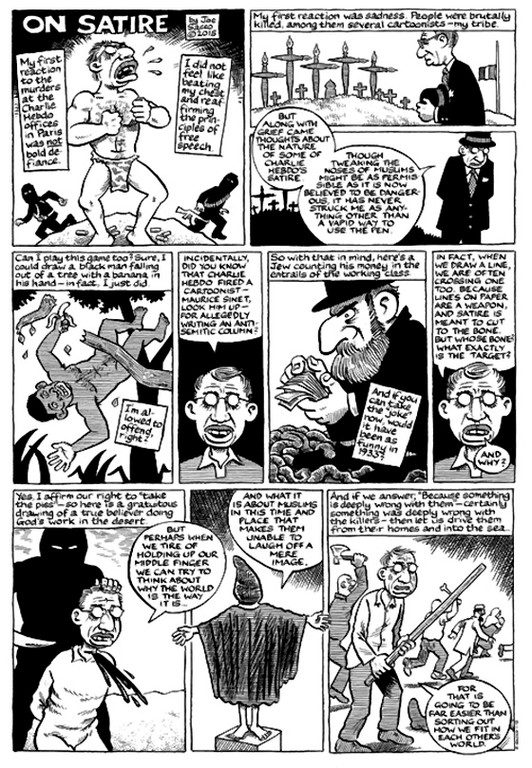Cartoonist urges restraint — except re: Israel
One might think cartoonists, as champions of irreverence and untrammeled free speech, would be unanimously resolute in defending their martyred comrades at the French satirical magazine Charlie Hebdo. Yet Joe Sacco, one of the most popular and outspoken of today’s political cartoonists, is actually constructing an argument for self-censorship. What Sacco prescribes is a kind of selective self-censorship, in which cartoonists refrain from insulting Muslims—but are free to target Israelis.
Showered with accolades and awards for his book-length graphic stories about serious historical topics such as World War I, Bosnia, and the Arab-Israeli conflict, Sacco has emerged as one of the most influential figures in making the comic art form respectable beyond the confines of comic fandom—and providing educators with an effective new way to teach history.
Thus it was no surprise that Sacco was a much-sought after commentator on the Charlie Hebdo slaughter. He told the New York Times that he was, of course, “disgusted” by the “really contemptible” killings. “But,” he hurried to add, “I also come from a position of trying to understand why people are affected by images, and not just say, ‘Why can’t you take a joke?’ An image of Muhammad in some compromising position isn’t meant to be just a joke.”
Salman Rushdie, perhaps the world’s most famous target of Islamist intolerance, recently referred to these rationalizers as “the ‘but’ brigade.” For Joe Sacco, Charlie Hebdo’s satirical portrayals of Islam’s founder were not satirical at all. They were not “meant to be just a joke.” They were meant to inflict harm. He is suggesting that it was the Charlie Hebdo staffers who started it, and the men who gunned them down were guilty—but with extenuating circumstances.

 47.0°,
Overcast
47.0°,
Overcast 




